七年级module4 Unit 1
新外研版七年级英语上册Module4 Unit1 教案

新外研版七年级英语上册Module4 Unit1教案教学目标- 研究并掌握有关学校设施的英语词汇与表达;- 学会询问与回答有关学校设施的问题;- 能够描述自己的学校设施。
教学准备- 海报或图片展示学校设施;- 教学PPT或投影仪。
教学过程1. 导入新课(5分钟)- 通过展示海报或图片引起学生对学校设施的兴趣;- 与学生进行简单讨论:你们学校有哪些设施?你们对学校哪些设施比较喜欢?2. 研究新词汇(10分钟)- 引导学生跟读新词汇并进行词汇操练。
3. 研究句型(15分钟)- 出示PPT或写在黑板上句型:“What facilities are there in your school?” 和“There is/are...”;- 解释句型用法,引导学生进行模仿和问答练。
4. 听力训练(15分钟)- 播放录音材料,要求学生听录音并回答问题,了解学校设施情况。
5. 合作探究(10分钟)- 让学生分小组,互相讨论并编写一篇关于自己学校设施的描述;- 鼓励学生通过合作分享和扩展知识。
6. 小结与展示(5分钟)- 随机选择几组学生进行展示他们写的描述;- 引导学生总结学到的知识点和句型。
7. 课后作业(5分钟)- 布置学生任务:以小组为单位,对比你们学校和我们学校的设施,并写一篇短文进行对比。
教学反思本节课通过展示学校设施、引导讨论、教授新词汇和句型、听力训练以及合作探究等多种教学方法,使学生能够掌握有关学校设施的英语表达。
同时,通过组织小组活动,培养了学生的合作能力和积极参与意识。
整节课时间紧凑,学生参与度高,达到了预期的教学目标。
外研版七年级上册英语Module4Unit1We’vegotlotsofapples.
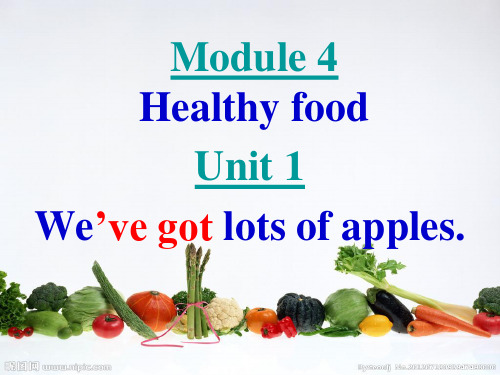
Work in groups (ABCD) A: Has he got any chocolate? B: Yes, he has. /No, he hasn’t.
√
√
×
×
Food Drink
Things Tony’s family has got at home
chocolate, apples
Let’s say说一说:
--Have you got any… ? -- Yes, I have.
-- Have you got any… ? -- No, I haven’t. -- So let’s get some.
(所以让我们去买一些)
-- Ok,good idea!
Tony and his dad are talking about going shopping. Let’s listen to the dialogue.
She has got a table.
2) 含有have / has got的肯定句变为否定 句时,在have或has后加not 即可。 have not 缩写 haven’t has not 缩写 hasn’t
e.g. They haven’t got a big television. 他们没有大电视。
food drink candy fruit meat
vegetables apples
beans
beef carrots
potatoes
chicken tomatoes
chocolate
coffee
cola
juice milk tea
water
Words and expressions
辽宁省大连市七年级英语《Module 4 Unit 1 We’ve got lots of apples》课件 外研版
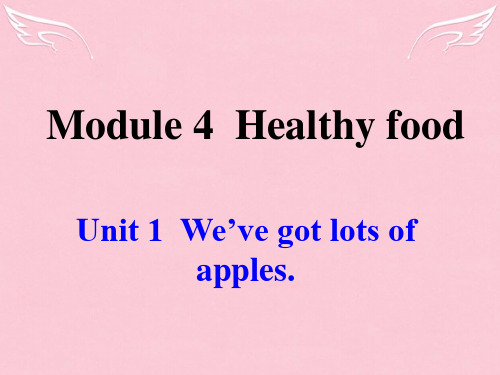
beef
Can you tell me some drinks?
milk
water
juice
Look at the pictures and talk about them.
Label the food and drink in the pictures with the words from the box.
potato(es) 土豆
tomato(es) 西红柿
Can you tell me some vegetables?
tomato tomatoes
potato potatoes
Look at these meat. Can you say the names of these meat?
chicken
chocolate candy beef
chicken
meat
carrot
potato
bean tomato vegetables tea juice coffee water milk cola
Put apple, bean, beef, carrot, chicken, chocolate, coffee, cola, juice, milk, orange, potato, tea, tomato, water in different boxes.
fruit
candy fruit meat vegetables源自candymeat
vegetables
Label the food and drink in the pictures with the words from the box. apple
orange
fruit
外研版七年级英语上册课件 Module4 Unit1

Let’s look and say! We have got some fruit. = We’ve got some fruit.
an orange
oranges /z/
an apple /'æpl/
Make a shopping list
Things Tony’s family has got at home
Food
Drink
×
chocolate Things Tony’s
apples family hasn’t
meat
got at home
chicken oranges
orange juice coffee
OK. Have we got any ____?
Yes, we have. ____ ______ chocolate isn't ____ for you. Let's get some _____.
What kind of fruit? ____?
No, we've got __ __ apples. We haven't got any _____, so let's get ________.
apples /z/
We have got some vegetables. = We’ve got some vegetables.
a carrot
['kærət]
a tomato a potato
[tə'mɑ:təu] [pə'teitəu]
beans
Starter+Module4+Unit1+课件+2023-2024学年外研版英语七年级上册

• Homework
• 根据音标拼读星期一到星期日; • 默写一周七天; • 一张分层作业卷。
Lead in
Let’s listen to an English song: Days of the week.
Which words do you hear in this song?
Which words do you hear in this song?
Monday, Tuesday, Wednesday, Thursday, Friday, Saturday Sunday,
Pair work!
telephone
door [dɔː]
window [ˈwɪndəʊ]
A:--What’s this in English? B:--___________________. A:--How do you spell “...”? B: ____________________. B:--What colour is the...? A:--It’s … B: -- What colour are the ...? A: -- They are ... Oh, it’s time to go now.Bye. B:--________________.
Miss Zhou: Gs it today?
Students: It’s Monday. Miss Zhou: Yes, it’s Monday.
Write it in your book. Students: M-O-N-D-A-Y, Monday. Miss Zhou: What day is it tomorrow? Students: Tuesday.
['wenzdei] ['θɜ:zdei]
Module 4 Unit 1 2022-2023学年外研版七年级英语上册
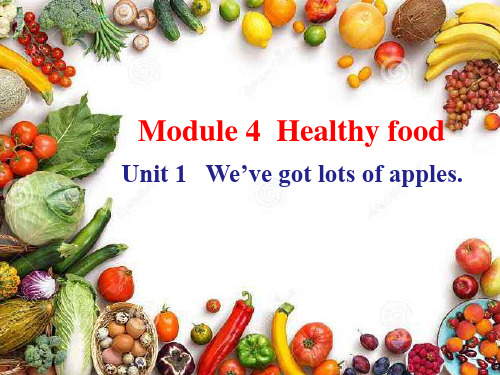
Unit 1 We’ve got lots of apples.
Let’s buy some food and drinks.
fruit 水果
apples['[æ'æppl]lz]
oorraannggees ['ɒrɪndʒ]z]
有
We have got some apples and oranges.
We have got some _c_h_o_c_o_la_t_e_._
We have got some _te_a_,_o_r_a_n_g_e__ju_i_c_e_,_c_o_f_fe_e_,_w__a_te_r_, _m_i_lk__a_n_d__c_o_la_._
apples oranges
vegetables 蔬菜
beans['bi:nz] carrots[[''kkæærrəətt]s]
We have got some beans and carrots.
vegetables 蔬菜
ppoottaattooes totommaatotoes [pə'teɪtəʊ]z] [[ttəə''mmɑɑ::ttəəʊʊz]]
We have got some _be_a_n_s_,_c_a_rr_o_ts_,_p_o_ta_t_o_es__a_n_d_to_m__a_to_es.
★可数名词复数以元音结尾,读/z/
We have got some a_p__p_le_s__a_n_d_o_r_a_n_g_e_s_._ We have got some b_e_a_n_s_, _ca_r_ro_t_s_, _p_o_ta_to_e_s_a_n_d__to_m_a_t_o_es. We have got some b__e_e_f _a_n_d_c_h_i_c_k_e_n_._
Module4+Unit1+教案 外研版英语七年级上册
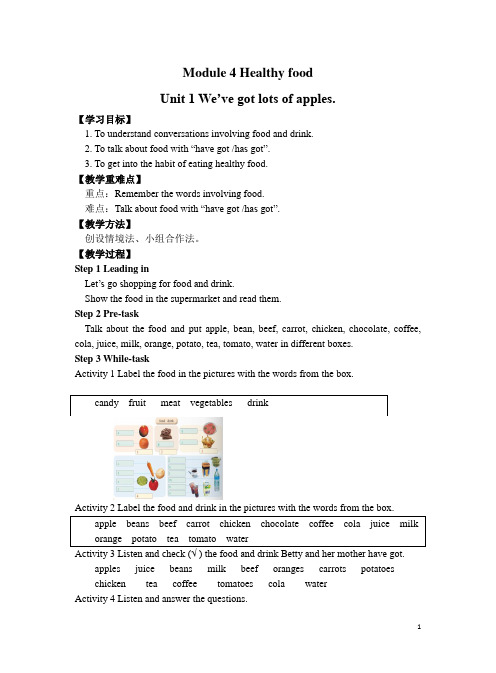
Module 4 Healthy foodUnit 1 We’ve got lots of apples.【学习目标】1. To understand conversations involving food and drink.2. To talk about food with “have got /has got”.3. To get into the habit of eating healthy food.【教学重难点】重点:Remember the words involving food.难点:Talk about food with “have got /has got”.【教学方法】创设情境法、小组合作法。
【教学过程】Step 1 Leading inLet’s go shopping for food and drink.Show the food in the supermarket and read them.Step 2 Pre-taskTalk about the food and put apple, bean, beef, carrot, chicken, chocolate, coffee, cola, juice, milk, orange, potato, tea, tomato, water in different boxes.Step 3 While-taskActivity 1 Label the food in the pictures with the words from the box.candy fruit meat vegetables drinkapple beans beef carrot chicken chocolate coffee cola juice milk orange potato tea tomato waterActivity 3 Listen and check (√ ) the food and drink Betty and her mother have got.apples juice beans milk beef oranges carrots potatoeschicken tea coffee tomatoes cola waterActivity 4 Listen and answer the questions.1. Have they got lots of (许多) apples?2. What kind of meat do they get?Things Tony’s family has got at home Things Tony’s family hasn’t got at homeFoodDrinkThen talk about Tony’s shopping.— Has he got any chicken?—No, he hasn’t.Activity 6 Retell.Tony and Tony’s dad go shopping for food and drink. They haven’t got any ______. They get some ________. They have got some _________ and ______. They haven’t got any _______. They have got some ____________. They have got some _________ for Mum. They haven’t got any _______. ______ is bad for Tony. They haven’t got some ____.Step 4 Post-taskActivity 1 Listen and repeat.Finish Part 7.Activity 2 Listen and choose.1. apples2. beans3. drinks4. potatoesActivity 3 Work in groups.A: Have they got any chocolate?B: Yes, they have./ No, they haven’t.Activity 4 Suppose (假如) a friend is coming for dinner. You and your family are talking about the food and drink.A: Mum, Tom is coming for dinner. Have we got any …?B: Yes, we have got some …A: Have we got any …?B: No, we haven’t. But we have got ……A: Thanks, Mum.Activity 5 Exercise.一、根据汉语完成句子1. 吃太多巧克力对你不好。
外研版英语七年级下册_Module4_Unit1参考教案

Module4 Unit1参考教案教学目标1.语言知识目标:掌握下列单词: chalk, ruler, question, carry, life, level, change, everything, future, in the future, need, will, maybe, ask, by, able, be able to, more, not ...any more, free2. 语言技能目标:1)能听懂谈论未来的简单对话,能判断未来事实。
2)能用will表达自己对未来的想象。
3. 情感目标:通过对未来美好的憧憬,培养积极乐观的精神。
教学方法以说为主要教学方式,以讨论为主要方法,通过同桌讨论和小组以及全班讨论,让每个学生充分练习口语和说的能力,并将听说读写有机地贯穿一体。
设立一些语言环境,结合自己或他人的旅游经历以及旅游景点,最后一起学习重难点,为突破重难点做一些课堂和课后的练习。
教学过程Step 1:Warming upGive some pictures and videos about the schools in the future to students. Let them watch it.Step 2:Work in pairs. Look at the picture of the Activity 1 and describe it. Use the words in the box to help you.Step 3:Listen and choose Lingling’s answers to the questions.1. Will our life be different in the future?Yes, it will. / No, it won’t.2. Will our school change?Yes, they will. / No, they won’t.3. Will everything be different?Yes, it will. / No, it won’t.4. Will students need computer at school?Yes, they will. / No, they won’t.5. Will they carry lots of books to school?Yes, they will. / No, they won’t.Answers: 1. Yes, it will. 2. Yes, they will. 3. Yes, it will. 4. Yes, they will.5. No, they won’t.Step 4:Listen and read the Activity 3. And then check (√) the students’ ideas about the future in the box of the Activity 3.Step5:To study Everyday English.¤ Well, I’m not sure.¤ That’s be great!Step6:Complete the passage of the Activity 4 with the correct form of the words and expression from the box.Betty: We’ll always (1) _____ teachers because computers will never be (2) _____ to check the students’ (3) ______ and answer their (4) ________ by (5) __________ or Internet. Will students need to go to school (6) __________? Yes, (7) ________ they will, because school is good fun, but everyone will have lots of (8) ______ time. Answers: (1) need (2) able (3) level (4) questions (5) telephone(6) any more (7) maybe (8) freeStep7:Listen and mark the stress. And then listen and repeat.blackboard computer eraser Internet telephoneStep8:Listen to those phonetic symbols of the Activity 6. And then listen and repeat.Step9:Work in pairs. Ask and answer the questions.1. Will schools be different in the future?2. Will students use books in the future?Step10:Work in pairs. Talk about what your school will be like in ten years.— We will study at home and only go to school for sports and games.—Well, this is good, but I’ll miss my teachers and friends.Step11:Study the following new words.chalk, ruler, question, carry, life, level, change, everything, future, in the future, need, will, maybe, ask, by, able, be able to, more, not ...any more, freeStep12:Explain and study the important and difficult points.1. The usage of word “more”.2. Difference between “in future”and “in the future”.3. The usage of word “free”.4. “in+ some time/ period of time”5. The usage o f word “by”.6. The usage of expression “be able to”.7. The usage of expression “not... any more”.8. The usage of expression “as well”.Step13:HomeworkReview and recite the important points of Unit 1.。
七年级英语上册M4 Unit 1课件

拓展 drink作名词,还可指“酒”。
讲解来自《点拨》
eg:Let's have a drink.咱们喝一杯吧。
drink用作不及My uncle doesn't drink.我的叔叔不喝酒。
eg:We should eat more fruit. 我们应该多吃水果。
讲解来自《点拨》
考向 fruit表示水果总称时,为不可数名词,无复数 形式;表示不同种类的水果时,是可数名词, 有复数形式。相同用法的词还有:food,drink。
讲解来自《点拨》
典例 Bananas,apples and oranges are all ___A_____.
考向一 shop作“购物”讲时,为不及物动词,所以 与宾语连用时,需加介词for,相当于buy。 eg:She wants to shop for some new clothes. 她想去购买一些新衣服。
(湖南株洲)
A.fruits
B.vegetables C.drinks
【点拨】考查名词词义理解。根据常识可知bananas, apples和oranges属于水果。
知识点 4 vegetable/'vedʒtəbl/ n. 蔬菜
讲解来自《点拨》
考向 它通常都是可数的,且通常用复数形式。 eg:There are many kinds of vegetables in my vegetable garden. 在我的菜园里有很多种蔬菜。
Tony: All right,some coffee for Mum,and some
新 外研七下练习Module4 Unit1 单元测试带答案和解析

外研版七年级下册Module4 Life in the futureUnit1 Everyone will study at home.一、根据音标写出单词和汉语1.[tʃɔːk]n.2.['ruːlə]n.3.['kærɪ]v.4.[tʃeɪn(d)ʒ]v.&n.5.['evrɪθɪŋ]pron.6.['fjuːtʃə]n.7.[laɪf]n.8.[niːd]v.&v.aux.9.[wɪl]v.aux.(would) 10.['meɪbiː;-bɪ]adv.11.[ɑːsk]v.12.['kwestʃ(ə)n]n.13.[baɪ]prep.14.['lev(ə)l]n.15.['eɪb(ə)l]adj.16.beableto17.[mɔː]adv.二、划线音标归类1.Ruler2. future3. student4. use5. blue6.But7. fun8. study9. us 10. put 11.c halk 12 would 13. everything 14. thank 15.father1.将来2.不再3.在二十年以后4.在互联网上5.在家学习6.使用电脑去做某事7.通过电脑,互联网或者电话8.获取信息9.检查学生的学习水平10.在黑板上11.有很多作业12.空闲时间13.回答学生们的问题14.需要做某事15.一块粉笔16.携带书籍去学校四、句型考查1.二十年后,也许没有学校了!______ ______ ______ _______, maybe there ________ ________ ______schools! 2.他们可以通过网络、电话或电子邮件问老师问题。
They can ask their teachers questions ________ ________,telephone or email. 3.哦,我不确定。
七年级下册英语Module 4 Unit 1 Everyone will study at home课件

√
√
Reading: 2.Read the part of Daming’s idea
• In Daming’s opinion, • 1. Will schools be different in the future? A. Yes, they will. B. No, they won’t. • 2. Will there be any schools? A. Yes, there will. B. No, there won’t.
Students will talk to their teachers on the Internet.
√ √
School is good fun and you can make friends there. No one will use pens, paper or erasers
Daming thinks … Betty thinks… …
maybe they will, because school any more Yes, (7) ________ _________?
is good fun, but everyone will have lots of (8) ______ free
time.
ቤተ መጻሕፍቲ ባይዱ
Speaking:
畅想未来 ,20年后 再次回到五中,我们的母校 将会有哪些变化,以小组为单位讨论,并记录。 (4个方面: 1号:学生的学习生活,2号:教师的教学,3号: 学生的作业,4号:教室的设备等。)
Listen and repeat.
/
/ / /
/ future student use
/ but fun study us ruler / put /
初一module 4 unit1 学案
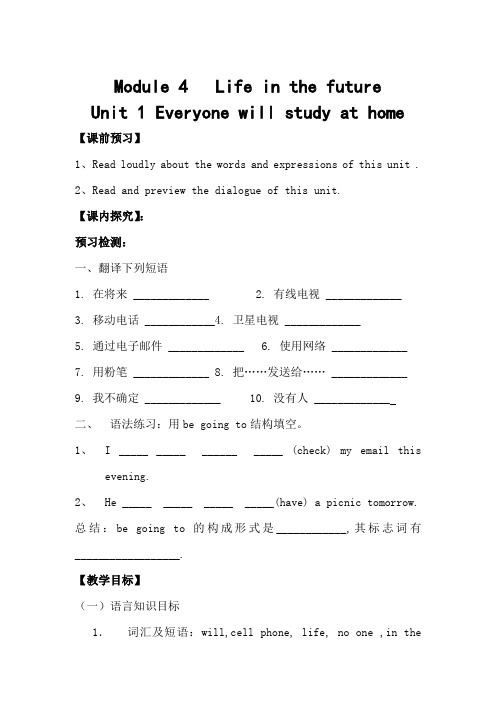
Module 4 Life in the future Unit 1 Everyone will study at home 【课前预习】1、Read loudly about the words and expressions of this unit .2、Read and preview the dialogue of this unit.【课内探究】:预习检测:一、翻译下列短语1. 在将来 _____________2. 有线电视 _____________3. 移动电话 ____________4. 卫星电视 _____________5. 通过电子邮件 _____________6. 使用网络 _____________7. 用粉笔 _____________8. 把……发送给…… _____________9. 我不确定 _____________ 10. 没有人 _____________二、语法练习:用be going to结构填空。
1、I _____ _____ ______ _____ (check) my email thisevening.2、He _____ _____ _____ _____(have) a picnic tomorrow. 总结:be going to的构成形式是____________,其标志词有__________________.【教学目标】(一)语言知识目标1.词汇及短语:will,cell phone, life, no one ,in thefuture.2.语法:will+动词原形表达一般将来时。
(二)能力目标通过听说练习,提高学生的听力、口语表达能力及交流合作能力。
(三)情感目标锻炼学生有目的、有计划地做事,使学生形成自主学习的能力,养成合理安排自己的好习惯。
【听力训练】一、Listen to the tape and check the true sentences for Daming and Betty.【对话处理】一、Listen to the tape again ,and finish the following questions.1、Will students go to school in the future?Yes,they will/No,they won’t.2、Will they study at home ?Yes,they will/No,they won’t.3、Will everyone send their homework by email?Yes,they will/No,they won’t.4、Will there be teachers?Yes,there will/No,there won’t.5、Will there be computers in school?Yes,there will/No,there won’t.6、Will we read books in the future?Yes,we will/No,we won’t.7、Will teachers use a blackboard and chalk?Yes,they will/No,they won’t.8、Will students use paper ,pencils and pens?Yes,they will/No,they won’t.二、读后学,重点知识讲解。
module-4-unit1-he-lives-the-farthest-from-school
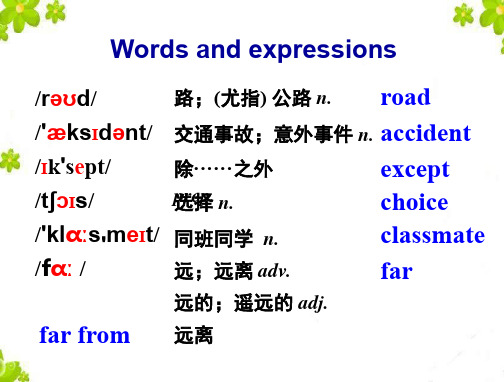
2. Tony lives the f_a_r_t_h_e_s_t___ from school.
3. Lingling’s home is the __c_lo_s_e_s_t__ to school, so she always walks. 4. For Betty, going to school by bike is the _b__es_t__ choice.
English(best)
cheap safe fast far from healthy comforta ble modern close to ……
……
Ask and answer --Which is the most popular way to travel?
it’s also the cheapest.
Now complete the table.
Ways to go to school
Betty Tony
by bus by underground
Lingling walk / on foot
Daming by bus
1.For Betty,by taxi is_th_e_m__o_st_comfortable way. but_i_t’_s_a_l_s_o__th_e__m_o_s_t _expensive.
Name 班级之最 Ways to school (why)
English(best) on foot youngest by bike/… sings best runs fastest oldest …
cheap safe fast far close to ……
-Who is the tallest in our class?
最新外研版七年级英语课件Module4_unit1 We've got lots of apples.
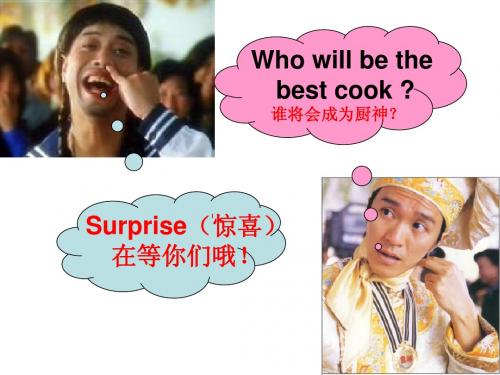
Words and expressions
n. 食物, 食品 n. 饮料 v. 喝 n. 糖果 n. 水果 n. 肉 n. 蔬菜 n. 苹果 n. 豆 food drink candy fruit meat vegetable apple bean
Words and expressions
n. 牛肉 n. 胡萝卜 n. 鸡肉 n. 巧克力 n. 咖啡 n. 可乐 n. 果汁 n. 牛奶 beef carrot chicken chocolate coffee cola juice milk
吸烟有害你的健康。 is bad for your health. Smoking ___________
Complete the table.
Things Tony’s family has got at home chocolate, Things Tony’s family hasn’t got at home chicken, oranges orange juice, coffee, cola, tea
1.一般的用法:some用于肯定句;any用 于疑问句,否定句或条件句。 some I am looking for ________pens. any Do you have ______pens? I do not any have _______pens. 2. 在期望对方肯定的回答时,问句也用 some。 some Would you like ________coffee? 3. any表任何或任何一个时,也可用于 肯定句。 You can take ______ any book .
1.Is too much chocolate good for our healthy? No, it isn’t. 2. Have they got lots of apples? Yes, they have. 3. Has Tony’s mum got any coffee?
外研版七年级英语上册课件:Module 4Unit1 (共56张PPT)

目录 contents
课堂导学
课堂导学
1. Now,we haven’t got any meat. Let’s get some chicken. 现在,我们没有肉了。我们买些鸡肉吧。 ◆some和any 既可修饰可数名词又可修饰不可 数名词。some用于肯定句或表示请求、建议的 句中。any用于否定句和疑问句中。
课前预习
一、必背单词 1. 食物;食品___f_o_o__d_____ 2. 糖果___c_a_n_d__y____ 3. 水果____fr_u_i_t_____
名词 4. 肉____m__e_a_t____ 5. 蔬菜__v_e_g_e_t_a_b_l_e__ 6. 苹果____a_p_p_l_e____
课前预习
一、必背单词 13. 果汁____ju__ic_e_____ 14. 牛奶____m__il_k_____ 15. 土豆;马铃薯___p_o_t_a_t_o____
名词 16. 茶____te__a______ 17. 番茄;西红柿___to__m__a_to____ 18. 水____w_a_t_e_r____ 19. 种类____k__in_d_____
课前预习
二、常用短语(请在课文中画出下列短语) 1. 去购物;去买东西 go shopping 2. 有 have got 3. 太多 too much 4. 许多;大量 lots of=a lot of 5. 对……有好处 be good for
•1、纪律是集体的面貌,集体的声音,集体的动作,集体的表情,集体的信念。 •2、知之者不如好之者,好之者不如乐之者。 •3、反思自我时展示了勇气,自我反思是一切思想的源泉。 •4、在教师手里操着幼年人的命运,便操着民族和人类的命运。一年之计,莫如树谷;十年之计,莫如树木;终身之计,莫如树人。 •5、诚实比一切智谋更好,而且它是智谋的基本条件。 •6、做老师的只要有一次向学生撒谎撒漏了底,就可能使他的全部教育成果从此为之失败。2021年11月2021/11/32021/11/32021/11/311/3/2021 •7、凡为教者必期于达到不须教。对人以诚信,人不欺我;对事以诚信,事无不成。2021/11/32021/11/3November 3, 2021 •8、教育者,非为已往,非为现在,而专为将来。2021/11/32021/11/32021/11/32021/11/3
外研版英语七年级上册Module 4 Unit1 核心词汇讲解

Unit1 核心词汇讲解1.food / fuːd/ n. 食物,食品。
大多数情况下为不可数名词,但当表示特定种类的食物,即表示物品的种类时为可数名词,类似的词还有drink, fruit, fish等。
The food here is delicious. 这儿的食物很好吃。
【拓展】食物类词汇小结:dumpling 饺子rice 大米;米饭noodle 面条sandwich 三明治hamburger汉堡包pizza 比萨2.drink / drɪŋk/ n. 饮料。
作名词“饮料〞讲时,一般为不可数名词,但是表示“一杯或一份饮料、酒水时,为可数名词。
这是一个固定用法,一般在前面加a, 即 a drink。
Let’s go for a drink. 让我们去喝一杯吧。
【拓展】drink v. 喝固定搭配:drink to 为……干杯,为……祝福。
All raise your glasses and drink to Katie and Tom!大家举杯祝福凯缇和汤姆吧!3.candy / 'kændɪ/ n. 糖果。
【拓展】既可以作可数名词,又可作不可数名词。
表示“一块糖〞用a candy, 表示“一盒糖〞用a box of candy。
candies是其复数形式,表示各种各样的糖。
在英式英语中,多用sweet表示“糖果〞。
Candy isn’t healthy food. 糖果不是安康的食物。
4.meat / miːt/ n. 肉。
The tiger likes to eat meat. 老虎喜欢吃肉。
【拓展】meat 是不可数名词,指各种肉的总称,包括pork猪肉, beef牛肉, chicken 鸡肉等。
pork, beef和chicken都是不可数名词。
chicken还可意为“小鸡〞。
5.chicken / tʃɪkɪn/ n. 鸡肉。
【拓展】为不可数名词,作为食品的鸡肉一律用chicken表示,不管这种肉来自cock还是hen。
Module 4 Unit 1 课时基础练 七年级英语上册 含答案解析外研版
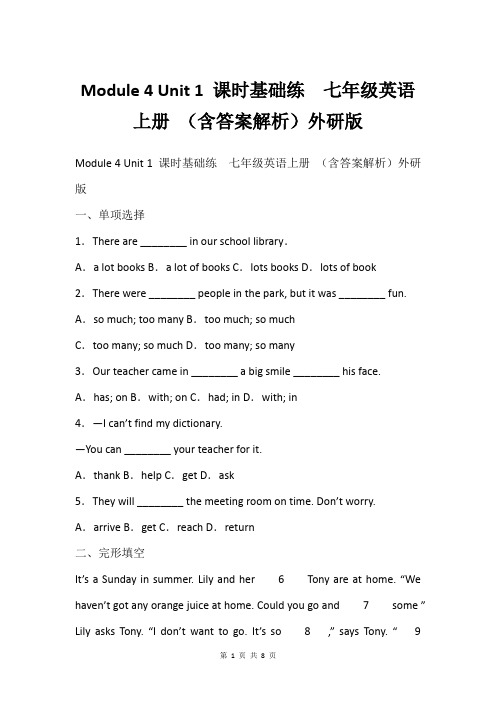
Module 4 Unit 1 课时基础练七年级英语上册(含答案解析)外研版Module 4 Unit 1 课时基础练七年级英语上册(含答案解析)外研版一、单项选择1.There are ________ in our school library.A.a lot books B.a lot of books C.lots books D.lots of book 2.There were ________ people in the park, but it was ________ fun. A.so much; too many B.too much; so muchC.too many; so much D.too many; so many3.Our teacher came in ________ a big smile ________ his face. A.has; on B.with; on C.had; in D.with; in4.—I can’t find my dictionary.—You can ________ your teacher for it.A.thank B.help C.get D.ask5.They will ________ the meeting room on time. Don’t worry. A.arrive B.get C.reach D.return二、完形填空It’s a Sunday in summer. Lily and her 6 Tony are at home. “We haven’t got any orange juice at home. Could you go and 7 some ” Lily asks Tony. “I don’t want to go. It’s so 8 ,” says Tony. “ 9this You buy orange juice for me, and you can get an ice cream. Here is the money.” Great! Tony loves ice cream. And 10 ice cream is his favourite. He 11 the money and goes to Mr White’s 12 . When he gets there, he says, “Good afternoon, Mr White. Please give me some orange…” Wait! Orange what Tony can’t 13 what Lily wants. “Does Lily want oranges 14 . I don’t think so. Maybe (也许) she wants orange ice cream,” Tony thinks. Then, Tony 15 home with chocolate ice cream and orange ice cream.6.A.sister B.mother C.brother D.father7.A.buy B.put C.play D.open8.A.cold B.cool C.hot D.warm9.A.How many B.How about C.What colour D.How old 10.A.apple B.milk C.banana D.chocolate11.A.makes B.gets C.brings D.takes12.A.hotel B.shop C.theatre D.farm13.A.spell B.find C.know D.remember14.A.Yes B.No C.Thanks D.Sorry15.A.arrives in B.gets to C.goes back D.goes to三、阅读单选Hello! I’m Li Xiang. This is my school lunch. We can eat rice, chicken and vegetables for lunch. I like tomatoes and eggs. I don’t like carrots.Hi, my name is Jane. This is my school lunch — chicken, carrots, breadand potatoes. Every day we have two hours (小时) for lunch. I like chicken and carrots.Hello! I’m Linda. My school lunch is nice. We can eat sausages (香肠), a tomato and some fruit. The drink is 100% apple juice. I like the juice very much.16.The three students are talking about their ________. A.breakfast B.lunch C.dinner D.schools17.Li Xiang doesn’t like________.A.carrots B.tomatoes C.eggs D.bread18.Jane can eat ________ kinds of food for lunch.A.three B.four C.five D.six19.________ can drink juice at lunchtime.A.Li Xiang B.Jane C.Linda D.No one20.Which of the following is TRUEA.Li Xiang has hamburgers for lunch.B.Jane doesn’t like eating carrots.C.Linda doesn’t like her school lunch.D.The three students all eat vegetables for lunch.试卷第1页,共3页试卷第1页,共3页参考答案:1.B【详解】句意:我们学校的图书馆里有很多书。
- 1、下载文档前请自行甄别文档内容的完整性,平台不提供额外的编辑、内容补充、找答案等附加服务。
- 2、"仅部分预览"的文档,不可在线预览部分如存在完整性等问题,可反馈申请退款(可完整预览的文档不适用该条件!)。
- 3、如文档侵犯您的权益,请联系客服反馈,我们会尽快为您处理(人工客服工作时间:9:00-18:30)。
3. Will everything be different? Yes, it will. / No, it won’t. 4. Will students need computer at school? Yes, they will. / No, they won’t. 5. Will they carry lots of books to school? Yes, they will. / No, they won’t.
Will students need to go to school (6) __________? maybe they any more Yes, (7) ________ will, because school is good fun, but everyone will have lots of (8) ______ free time.
He isn’t a child any more. 他不再是小孩子了。 I won’t do that any more. 我再也不那样做了。
Homework
Review and recite the important
points of Unit 1.
复习并记忆 Unition n. 问题 ruler n. 尺子 chalk n. 粉笔 life n. 生活; 生命 level n. 水平
小组活动 —— 想象一下你心目中未 来的学校的样子吧!
Students will use computers and get information on the Internet. Teacher won’t use chalk in the future.
Listen and mark the stress.
Now listen and repeat.
Listen and repeat.
/
/ / /
/ future student use
/ but fun study us ruler / put /
Ask and answer the questions.
Teachers won’t use chalk on a blackboard and students won’t use pen and paper, or erasers any more! 老师们将不再用粉笔在 黑板上写字,学生们也将不再使用钢笔、 纸或橡皮! 句中的 “not ... any more”的意思是 “不再”。例如:
more
adv. 更加;更
adj. 更多的
not … any more … 不再……
e.g. I don’t want to eat any more.
free adj. (时间) 空闲的;空余的
e.g. I have some free time now.
你都记住了吗?
你太棒啦!
重难点讲解
more 是形容词 many 和 much “多的” 的比较级。意为“更多的”,即: many — more 多的 更多的
例如: I am free today but I was busy yesterday. 今天我有空,但昨天我很忙。
in future “今后”,表示从今以后
in the future “将来”,表示未来。
例如:
Please be more careful in future.
今后小心点。 I don’t know what will happen in the future. 我不知道将来会发生什么事。
Look at the picture and describe it. Use the words in the box to help you. blackboard chalk computer email
eraser paper pencil telephone
Internet pen ruler
— We will study at home and only go to school for sports and games. — Well, this is good, but I’ll miss my teachers and friends.
carry v. 拿;带 e.g. Let me carry them for you. change v. & n. 改变;变化 e.g. Let’s change the subject. need v. & v. aux. 需要 e.g. I need your help. able adj. 能够……的 e.g. I’m able to learn this new lesson.
need teachers Betty: We’ll always (1) _____ because computers will never be (2) _____ level able to check the students’ (3) ______ and answer their (4) _________ questions by (5) __________ telephone or Internet.
They can ask their teachers questions by Internet, telephone or email. 他们可以通过互联网、电话或电子邮件 向老师提问。 句中的 “by”表示方式,意 思是“用……,靠……,通 过……”。 例如: Send it by air mail. 用航空邮件寄吧。 They want to travel by train. 他们想坐火车旅行。
Computer won’t be able to do that. 计算机无法胜任。
句中的 “be able to”的意思是“能够, 会,胜任”。相当于 can,比起 can 来 可以用于更多的时态中。例如: I’m able to swim. = I can swim. 我会游泳。
再如: They will be able to tell you the news soon. = They can tell you the news soon. 他们很快就能够告诉你这个消息了。 He was able to write when he’s three. = He could write when he’s three. 他两岁就会写字了。
much — more 多的 更多的
如: many books — more books much milk — more milk
许多书 更多书 许多牛奶 更多牛奶
free 是形容词,意思是“(时间)空闲; 空余的”,反义词是 busy “忙碌的”。 即:
free — busy 空闲的 反义词 忙碌的
1. Will schools be different in the
future?
2. Will students use books in the future?
小组活动——展开联想的 ~翅膀~
Talk about what your school will be like in ten years.
Listen and choose Lingling’s answers to the questions.
carry change everything future life need will
1. Will our life be different in the future? Yes, it will. / No, it won’t. 2. Will our school change? Yes, they will. / No, they won’t.
√
√
School is good fun and you can make friends there.
√
No one will use pens, paper or erasers.
√
Complete the passage with the correct form of the words and expression from the box.
你都记住了吗?
你太棒啦!
重难点突破
In 20 year’s time, maybe there won’t be any schools. 二十年之后,也许一所学校 都没有了。
句中的 “in + 一段时间”表示“一段时间 之后”,常用于将来时。可以用 how soon 来提问。例如: — How soon will you be back? 你多久回来? — In a week. 一个月之后。
will v. aux. (would) 将;将要;将会 e.g. Our life will change a lot in the future. ask v. 询问;问 e.g. Can I ask you a question? by prep. 用;靠;乘(交通工具) e.g. I often go to school by bike.
¤ Well, I’m not sure. 喔,我不确定。 ¤ That’ll be great! 那太棒了!
Now check (√) the students’ ideas about the future. Ideas Everyone will study at home in the future. Students will talk to their teachers on the Internet. Daming Betty Tony
